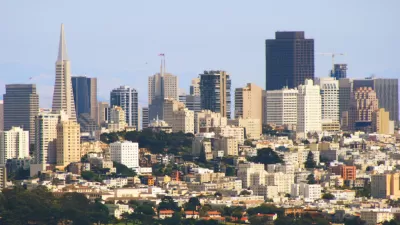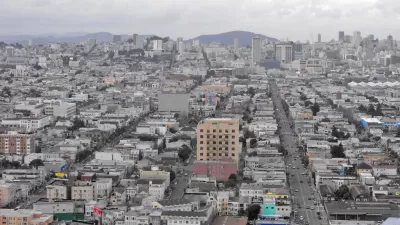Over the heckles of hundreds of residents opposed to higher density and the two regional planning agencies making the decision, the Bay Area's growth plan designed to cut carbon emissions 15% by 2040 through better planning was approved.

Laura Dixon and the Bay City News Service write about the "marathon joint meeting of the Metropolitan Transportation Commission (MTC) and the Association of Bay Area Governments (ABAG) at the Oakland Marriott" on July 18. The controversial Plan Bay Area was approved late Thursday night over the protests of hundreds of Marin, some of whom had arrived by chartered bus, and Santa Clara residents, many who argued that "such a plan should be subject to a public vote". Others claimed that "the plan would give the government undue authority to dictate where and how communities are allowed to develop housing." Still others charged the plan represented "social engineering" and "a plot to force low-income housing on wealthy communities".
Other groups, including Oakland-based TransForm, successfully asked for more funding for affordable housing and public transit funding.
Jeremy Madsen, executive director of the regional conservation organization, Greenbelt Alliance that's also behind the initiative, Grow Smart Bay Area, wrote, "One of the big (and pleasant) surprises from the night was the inclusion of an amendment that links funds from the One Bay Area Grant program to the production, acquisition, and rehabilitation of affordable homes."
According to Madsen, highlights from the plan include:
- No sprawl for 30 years—100% of new growth will be within existing urban boundaries
- Nearly 80% of new homes and over 60% of new jobs will be near public transit
With approval by the region's metropolitan planning organization (MTC) and coalition of governments (ABAG), the Bay Area joins the San Diego, Los Angeles and Sacramento regions in adopting regional growth plans that comply with the 2008 state law, SB 375.
FULL STORY: Bay Area leaders adopt regional plan to accommodate future population growth

Planetizen Federal Action Tracker
A weekly monitor of how Trump’s orders and actions are impacting planners and planning in America.

Maui's Vacation Rental Debate Turns Ugly
Verbal attacks, misinformation campaigns and fistfights plague a high-stakes debate to convert thousands of vacation rentals into long-term housing.

San Francisco Suspends Traffic Calming Amidst Record Deaths
Citing “a challenging fiscal landscape,” the city will cease the program on the heels of 42 traffic deaths, including 24 pedestrians.

Amtrak Rolls Out New Orleans to Alabama “Mardi Gras” Train
The new service will operate morning and evening departures between Mobile and New Orleans.

The Subversive Car-Free Guide to Trump's Great American Road Trip
Car-free ways to access Chicagoland’s best tourist attractions.

San Antonio and Austin are Fusing Into one Massive Megaregion
The region spanning the two central Texas cities is growing fast, posing challenges for local infrastructure and water supplies.
Urban Design for Planners 1: Software Tools
This six-course series explores essential urban design concepts using open source software and equips planners with the tools they need to participate fully in the urban design process.
Planning for Universal Design
Learn the tools for implementing Universal Design in planning regulations.
Heyer Gruel & Associates PA
JM Goldson LLC
Custer County Colorado
City of Camden Redevelopment Agency
City of Astoria
Transportation Research & Education Center (TREC) at Portland State University
Jefferson Parish Government
Camden Redevelopment Agency
City of Claremont



























